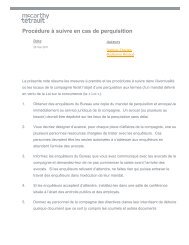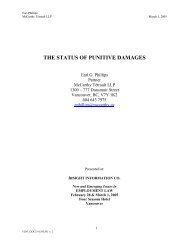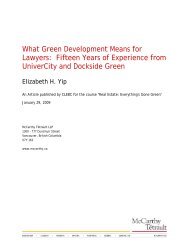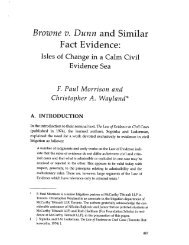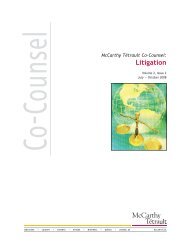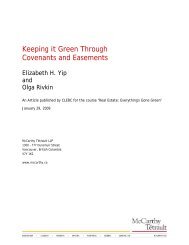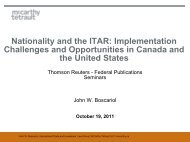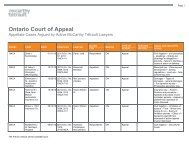The Doctrine of Public Policy in Canadian Contract Law
The Doctrine of Public Policy in Canadian Contract Law
The Doctrine of Public Policy in Canadian Contract Law
Create successful ePaper yourself
Turn your PDF publications into a flip-book with our unique Google optimized e-Paper software.
<strong>The</strong> <strong>Doctr<strong>in</strong>e</strong> <strong>of</strong> <strong>Public</strong> <strong>Policy</strong> <strong>in</strong> <strong>Canadian</strong> <strong>Contract</strong> <strong>Law</strong> 1 21<br />
<strong>of</strong> the proceed<strong>in</strong>gs), 1"2 an agreement to procure evidence for use at a civil trial,'"'<br />
and an agreement which prevented a witness from giv<strong>in</strong>g evidence at future<br />
civil actions.'°4 A contract which seeks to conceal a statutory <strong>of</strong>fence has also<br />
been deemed to fall with<strong>in</strong> this head <strong>of</strong> public policy.'05 However, the pr<strong>in</strong>cipal<br />
type <strong>of</strong> contract which has been found <strong>in</strong>valid on this ground is an agreement<br />
which <strong>in</strong>volves as consideration the promise to "stifle" or suppress the prosecution<br />
<strong>of</strong> an <strong>of</strong>fence.'°6<br />
<strong>The</strong> second head <strong>of</strong> the category <strong>of</strong> contracts which are <strong>in</strong>jurious to the<br />
judiciary <strong>in</strong>volves agreements that seek to oust the jurisdiction <strong>of</strong> the court.'°7<br />
102 Sym<strong>in</strong>gton v. Vancouver Breweries Ltd., [1931] 1 D.L.R. 935 (B.C. C.A.).<br />
103 Pay v. Kaboly-Zadeh, 2006 BCSC 925 at paras. 139-145.<br />
104 Flexi-Coil Ltd. v. Smith Roles Ltd. (1980), 50 C.P.R. (2d) 29 (Fed. T.D.), affirmed<br />
(1981), [1982] 1 F.C. 533 (C.A.). An agreement whereby one defendant refuses to<br />
voluntarily co-operate with another defendant <strong>in</strong> the pla<strong>in</strong>tiff's action aga<strong>in</strong>st the latter<br />
is not contrary to public policy where it does not require the first defendant to suppress<br />
evidence: Northland Bank v. Willson (1994), 157 A.R. 172, [1994] A.J. No. 729 (C.A.),<br />
leave to appeal refused (1994), 26 Alta. L.R. (3d) 1 (note) (S.C.C.) at paras. 2-3 [QL].<br />
Similarly, an agreement not to discuss evidence with another party prior to trial will not<br />
violate public policy where the agreement provides that the contract<strong>in</strong>g party will respond<br />
truthfully to a subpoena if called upon to do so: Ba<strong>in</strong>s v. Bhandar, 2000 BCCA 466<br />
(C.A.), leave to appeal refused (2001), 269 N.R. 206 (note), [2000] S.C.C.A. No. 528<br />
(S.C.C.) at paras. 41-43.<br />
105 See Initial Services v. Putterill (1967), [1968] 1 Q.B. 396 (Eng. C.A).<br />
106 Although the <strong>of</strong>fence for which the prosecution has been suppressed need not be crim<strong>in</strong>al,<br />
it must be <strong>of</strong> a sufficiently "public" character to fall with<strong>in</strong> the scope <strong>of</strong> the pr<strong>in</strong>ciple:<br />
see Johnson v. Musselman (1917), 37 D.L.R. 162 (Alta. S.C. (App. Div.)). <strong>The</strong>re is a<br />
comparatively large body <strong>of</strong> jurisprudence which considers when an <strong>of</strong>fence will be<br />
"public" <strong>in</strong> this sense. In People's Bank <strong>of</strong> Halifax v. Johnson (1892), 20 S.C.R. 541,<br />
1982 CarswellNS 77, the Supreme Court <strong>of</strong> Canada relied upon this branch <strong>of</strong> the public<br />
policy doctr<strong>in</strong>e <strong>in</strong> declar<strong>in</strong>g void a bond which was provided to a bank <strong>in</strong> consideration<br />
for its agreement not to prosecute one <strong>of</strong> its former agents, who had embezzled bank<br />
funds and subsequently married the daughter <strong>of</strong> the surety. Ritchie C.I., who delivered<br />
the lead<strong>in</strong>g judgment, stated (at para. 9) that: "[t]he allowance <strong>of</strong> such an objection as<br />
this is not for the sake <strong>of</strong> the party who raises it but is grounded on general pr<strong>in</strong>ciples <strong>of</strong><br />
policy. Where the fact comes to the knowledge <strong>of</strong> a party, as this most assuredly did,<br />
that a felony has been committed, if it is not his duty to prosecute it certa<strong>in</strong>ly is contrary<br />
to his duty to compromise or compound the felony. . ." A recent example <strong>of</strong> an agreement<br />
be<strong>in</strong>g held <strong>in</strong>valid on similar facts can be found <strong>in</strong> Newell v. Royal Bank (1997), 147<br />
D.L.R. (4th) 268, [1997] N.S.J. No. 13 (N.S. C.A.) at para. 20.<br />
107 <strong>The</strong>re is also an <strong>in</strong>terest<strong>in</strong>g stra<strong>in</strong> <strong>of</strong> public policy which may be <strong>in</strong>terpreted as address<strong>in</strong>g<br />
contracts that oust the jurisdiction <strong>of</strong> the legislature (although some authors, such as<br />
Fridman, supra note 5 at 349, treat this as an <strong>in</strong>stance <strong>of</strong> statutory illegality, albeit one<br />
<strong>in</strong>fused with public policy considerations). This <strong>in</strong>volves cases <strong>in</strong> which the courts have<br />
declared <strong>in</strong>valid contracts which purport to preclude the application <strong>of</strong> a specific statutory<br />
regime. In order for this pr<strong>in</strong>ciple to be engaged, it would appear that the statutory regime<br />
<strong>in</strong> question must possess a sufficiently "public" character and apply to circumstances<br />
<strong>in</strong>volv<strong>in</strong>g an asymmetry <strong>of</strong> barga<strong>in</strong><strong>in</strong>g power. <strong>The</strong> contract should also give one party a<br />
lesser right than it would otherwise be entitled to. See generally: Ontario (Human Rights<br />
Commission) v. Etobicoke (Borough), [1982] 1 S.C.R. 202, 1982 CarswellOnt 730 at



